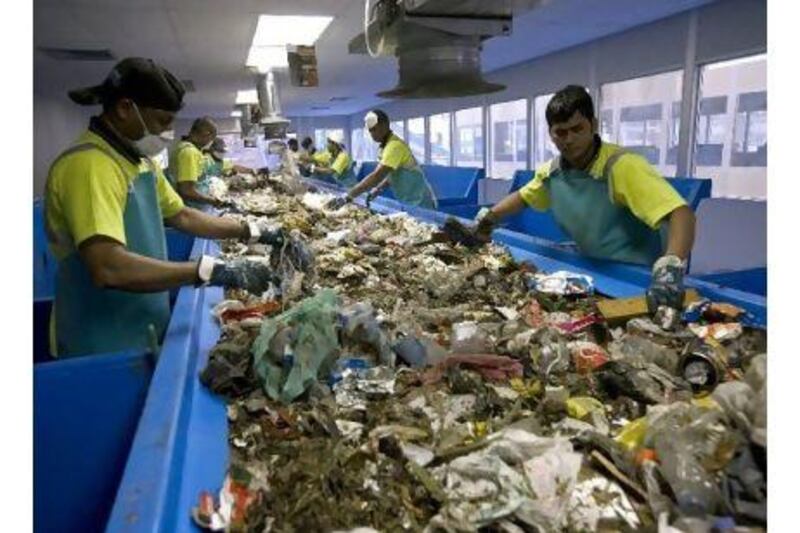I refer to your article Abu Dhabi Police to hand out iftars in bid to make capital's roads safer (July 31).
Last year the roads were a nightmare every day around 3pm, when everyone was leaving the office.
Traffic was heavy, but also drivers were changing lanes suddenly without blinkers or driving too slowly, which made other drivers honk or even get into accidents.
The best solution for this would be having people working in the government sector start work one hour later in the morning and leave an hour later in the afternoon, so they work from 10am - 4pm, while private companies work from 9am - 3pm.
Elcy Suleiman, Abu Dhabi
The police simply encourage drivers to speed by announcing in the media - including via an advertisement in The National July 31 - that "for light vehicles, the radar speed limit on Abu Dhabi - Al Ain road from Bani Yas Park bridge to Al Saad police station is 160km/hr".
A speed limit of 160km/hr will naturally invite drivers to speed beyond 160km/hr, and slow down to 160 as they get close to a radar.
My 31 years of teaching pilots have convinced me that mere fines are no deterrent for some people. As a matter of fact, the highest payer of traffic fines in my class one year was plainly proud of his "achievement".
The police need to rethink.
Kanwar Hayat, Dubai
I refer to your article Dangerous driving is rooted in UAE culture, poll suggests (July 30).
I left the UAE recently after living, since 1994, in Sharjah, Dubai, Fujairah and Al Ain. In my opinion driving in the UAE has become worse over those years.
In my country, Australia, offenders would have their cars impounded, pay a very hefty fine, face licence suspension and for repeat offences would be jailed.
There needs to be a serious education programme in schools and via advertising, to appeal to national pride and to male integrity.
I drove a lot and sometimes felt that others out there were trying to kill me!
Philip Orgill, Australia
What a tragic traffic story (Man burns to death after his parked car is hit from behind, July 31).
Even in the Al Ain-Abu Dhabi road it is very difficult find a proper parking space for a person to have a nap during a night-time drive.
Why can't they provide one parking space every 15-20 kilometres?
Mohamed Thanveer, Dubai
Officers shouldn't dictate to civilians
Your story Turkey's military command quits in row with government (July 29) poses questions about the patriotism of some generals.
Some of them seem more concerned about their status quo hold on power than protection of the state from foreign powers.
The military's prime objective should always be to secure the border and safeguard the national interest, not to dictate to the elected government.
No sane government would ever promote any individual who is being held pending investigation.
Joe Burns, Abu Dhabi
Recycling is not easy to get started
This is about your article Landfills bulge with plastic bottles (July 31).
Coming as I do from a western country with well-developed and profitable recycling industry, I admit that I cringe every time I throw away anything that could be recycled, especially the water bottles which are so ubiquitous here.
It takes a long time to set up the infrastructure for recycling, not just a plant but also collection methods. And getting individuals to recycle is an even harder challenge when people live in flats, where there's less room to store material until recycling day.
Still, a robust recycling system could pay for itself - and make us all feel better, too. It's worth the effort.
Raymond Sedgwick, Abu Dhabi
Book based on more than trial
As the co-author of Chasing Aphrodite, I was grateful for the review published in The National (New book traces the Getty Museum's illegal acquisition of antiquities, July 31).
However, it included some unfortunate errors. First, our book was not based largely on coverage of the Marion True trial, but on documents in the case, hundreds of internal Getty documents and over 300 interviews. Much of the book describes decisions and purchases of antiquities before the 2005 indictment and trial.
Second, the review seems to have mixed up two sets of incriminating photographs and who discovered them. You say it was Getty investigators who discovered photos in a Geneva warehouse that led to criminal charges against Marion True. In fact, those photos were discovered by Italian and Swiss officials. Meanwhile, you say the Italians discovered photos of the disassembled Aphrodite statue, when in fact it was the Getty and an outside law firm that tracked down those photos.
Ralph Frammolino, Bangladesh
a





